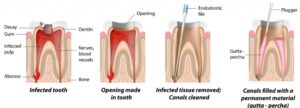

Root canal treatment, also called endodontic therapy, is a dental procedure that removes inflamed or infected pulp from inside the tooth. The pulp is the soft tissue containing blood vessels, nerves, and connective tissue inside the root canal. The purpose of a root canal is to eliminate the bacteria from the infected root canal, prevent reinfection of the tooth, and save the natural tooth.
Modern techniques and anesthesia make root canal procedures relatively painless.
Root canals cause illness—this myth originated from outdated research and has been debunked. Root canal treatments are safe and do not cause disease.
Keeping your natural tooth is often better than removing it and replacing it with an artificial one.
A root canal treatment is needed when the pulp (which is a soft tissue present inside the tooth) is infected or damaged. A root canal treatment is required when the following symptoms are present:
The dentist examines the tooth and takes X-rays to determine the extent of damage. Local anesthesia is administered to numb the tooth and surrounding area.
A small hole is drilled into the tooth surface to access the pulp chamber and root canals.
Locating the Canals and Pulp Removal: The dentist uses specialized instruments to locate the root canals and remove the damaged or infected pulp tissue.
The dentist uses files to clean and shape the inside of the canals, removing infected tissue and debris.
A disinfectant solution is used to flush the canals to remove any remaining bacteria or debris.
The canals are filled with a biocompatible material, typically gutta-percha, and sealed with adhesive cement.
A temporary or permanent filling is placed to seal the access hole drilled at the beginning of the procedure.
A crown or permanent restoration is placed on the tooth to protect it and restore its function, usually in a subsequent visit.
Follow-up: The dentist schedules a follow-up appointment to check on the healing process and to remove any temporary fillings. Cost and Insurance
The cost of root canal treatment can vary widely depending on several factors, including the tooth involved, the complexity of the procedure, the dentist’s experience, and the location of the clinic. On average, the cost of root canal treatment ranges from Rs: 5,000 to Rs: 8,000 per tooth.
Molars, which are located at the back of the mouth, generally cost more than front teeth due to their complex anatomy and additional canals.
Endodontists, who are specialists in root canal treatment, may charge more than general dentists due to their advanced training and experience.
The cost of dental treatment can vary significantly based on the region. Some areas and locations with the highest cost of living typically have higher dental fees.
If you have dental insurance, your out-of-pocket costs for a root canal may be significantly lower.
Root canals are often covered by dental insurance, but the extent of the coverage can vary widely depending on the insurance plan. Many dental insurance plans cover a significant portion of the cost of a root canal, typically ranging from 50% to 80% after the deductible is met. Dental insurance plans often have an annual maximum benefit limit, which is the total amount the insurance will pay in a given year. If your dental expenses exceed this limit, you will need to cover the remaining costs out of pocket.
Contact: Solitairefamilydentistry.com